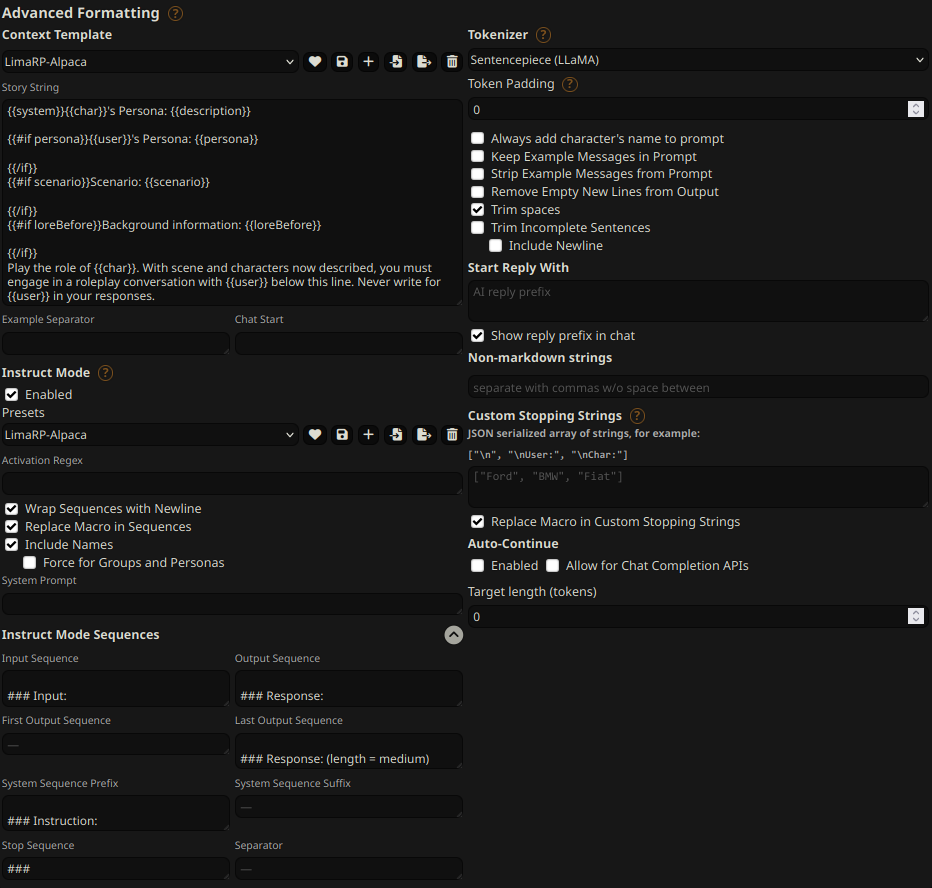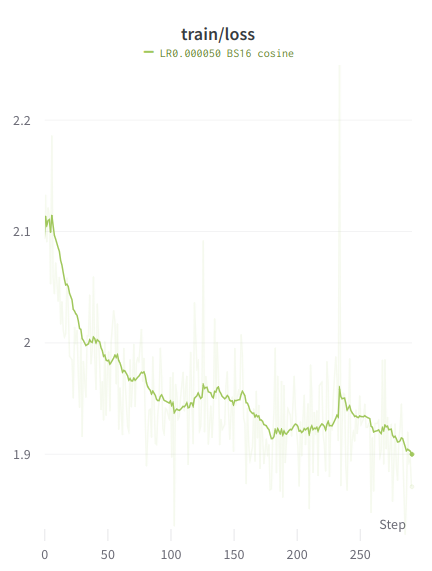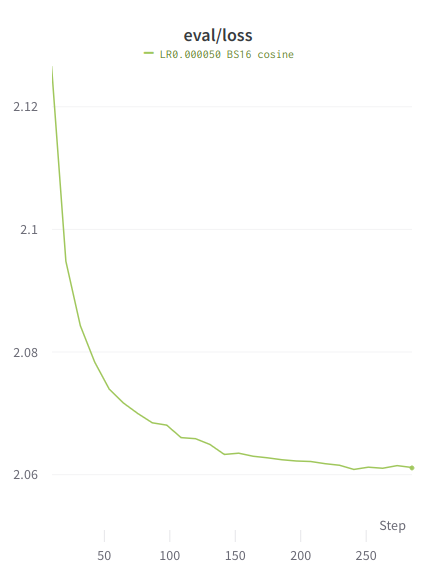
TheBloke's LLM work is generously supported by a grant from andreessen horowitz (a16z)
AshhLimaRP Mistral 7B - GGUF
- Model creator: Suikamelon
- Original model: AshhLimaRP Mistral 7B
Description
This repo contains GGUF format model files for Suikamelon's AshhLimaRP Mistral 7B.
These files were quantised using hardware kindly provided by Massed Compute.
About GGUF
GGUF is a new format introduced by the llama.cpp team on August 21st 2023. It is a replacement for GGML, which is no longer supported by llama.cpp.
Here is an incomplate list of clients and libraries that are known to support GGUF:
- llama.cpp. The source project for GGUF. Offers a CLI and a server option.
- text-generation-webui, the most widely used web UI, with many features and powerful extensions. Supports GPU acceleration.
- KoboldCpp, a fully featured web UI, with GPU accel across all platforms and GPU architectures. Especially good for story telling.
- LM Studio, an easy-to-use and powerful local GUI for Windows and macOS (Silicon), with GPU acceleration.
- LoLLMS Web UI, a great web UI with many interesting and unique features, including a full model library for easy model selection.
- Faraday.dev, an attractive and easy to use character-based chat GUI for Windows and macOS (both Silicon and Intel), with GPU acceleration.
- ctransformers, a Python library with GPU accel, LangChain support, and OpenAI-compatible AI server.
- llama-cpp-python, a Python library with GPU accel, LangChain support, and OpenAI-compatible API server.
- candle, a Rust ML framework with a focus on performance, including GPU support, and ease of use.
Repositories available
- AWQ model(s) for GPU inference.
- GPTQ models for GPU inference, with multiple quantisation parameter options.
- 2, 3, 4, 5, 6 and 8-bit GGUF models for CPU+GPU inference
- Suikamelon's original unquantised fp16 model in pytorch format, for GPU inference and for further conversions
Prompt template: LimaRP-Alpaca
### Instruction:
Character's Persona: bot character description
User's persona: user character description
Scenario: what happens in the story
Play the role of Character. You must engage in a roleplaying chat with User below this line. Do not write dialogues and narration for User. Character should respond with messages of medium length.
### Input:
User: {prompt}
### Response:
Character:
Compatibility
These quantised GGUFv2 files are compatible with llama.cpp from August 27th onwards, as of commit d0cee0d
They are also compatible with many third party UIs and libraries - please see the list at the top of this README.
Explanation of quantisation methods
Click to see details
The new methods available are:
- GGML_TYPE_Q2_K - "type-1" 2-bit quantization in super-blocks containing 16 blocks, each block having 16 weight. Block scales and mins are quantized with 4 bits. This ends up effectively using 2.5625 bits per weight (bpw)
- GGML_TYPE_Q3_K - "type-0" 3-bit quantization in super-blocks containing 16 blocks, each block having 16 weights. Scales are quantized with 6 bits. This end up using 3.4375 bpw.
- GGML_TYPE_Q4_K - "type-1" 4-bit quantization in super-blocks containing 8 blocks, each block having 32 weights. Scales and mins are quantized with 6 bits. This ends up using 4.5 bpw.
- GGML_TYPE_Q5_K - "type-1" 5-bit quantization. Same super-block structure as GGML_TYPE_Q4_K resulting in 5.5 bpw
- GGML_TYPE_Q6_K - "type-0" 6-bit quantization. Super-blocks with 16 blocks, each block having 16 weights. Scales are quantized with 8 bits. This ends up using 6.5625 bpw
Refer to the Provided Files table below to see what files use which methods, and how.
Provided files
| Name | Quant method | Bits | Size | Max RAM required | Use case |
|---|---|---|---|---|---|
| ashhlimarp-mistral-7b.Q2_K.gguf | Q2_K | 2 | 3.08 GB | 5.58 GB | smallest, significant quality loss - not recommended for most purposes |
| ashhlimarp-mistral-7b.Q3_K_S.gguf | Q3_K_S | 3 | 3.16 GB | 5.66 GB | very small, high quality loss |
| ashhlimarp-mistral-7b.Q3_K_M.gguf | Q3_K_M | 3 | 3.52 GB | 6.02 GB | very small, high quality loss |
| ashhlimarp-mistral-7b.Q3_K_L.gguf | Q3_K_L | 3 | 3.82 GB | 6.32 GB | small, substantial quality loss |
| ashhlimarp-mistral-7b.Q4_0.gguf | Q4_0 | 4 | 4.11 GB | 6.61 GB | legacy; small, very high quality loss - prefer using Q3_K_M |
| ashhlimarp-mistral-7b.Q4_K_S.gguf | Q4_K_S | 4 | 4.14 GB | 6.64 GB | small, greater quality loss |
| ashhlimarp-mistral-7b.Q4_K_M.gguf | Q4_K_M | 4 | 4.37 GB | 6.87 GB | medium, balanced quality - recommended |
| ashhlimarp-mistral-7b.Q5_0.gguf | Q5_0 | 5 | 5.00 GB | 7.50 GB | legacy; medium, balanced quality - prefer using Q4_K_M |
| ashhlimarp-mistral-7b.Q5_K_S.gguf | Q5_K_S | 5 | 5.00 GB | 7.50 GB | large, low quality loss - recommended |
| ashhlimarp-mistral-7b.Q5_K_M.gguf | Q5_K_M | 5 | 5.13 GB | 7.63 GB | large, very low quality loss - recommended |
| ashhlimarp-mistral-7b.Q6_K.gguf | Q6_K | 6 | 5.94 GB | 8.44 GB | very large, extremely low quality loss |
| ashhlimarp-mistral-7b.Q8_0.gguf | Q8_0 | 8 | 7.70 GB | 10.20 GB | very large, extremely low quality loss - not recommended |
Note: the above RAM figures assume no GPU offloading. If layers are offloaded to the GPU, this will reduce RAM usage and use VRAM instead.
How to download GGUF files
Note for manual downloaders: You almost never want to clone the entire repo! Multiple different quantisation formats are provided, and most users only want to pick and download a single file.
The following clients/libraries will automatically download models for you, providing a list of available models to choose from:
- LM Studio
- LoLLMS Web UI
- Faraday.dev
In text-generation-webui
Under Download Model, you can enter the model repo: TheBloke/AshhLimaRP-Mistral-7B-GGUF and below it, a specific filename to download, such as: ashhlimarp-mistral-7b.Q4_K_M.gguf.
Then click Download.
On the command line, including multiple files at once
I recommend using the huggingface-hub Python library:
pip3 install huggingface-hub
Then you can download any individual model file to the current directory, at high speed, with a command like this:
huggingface-cli download TheBloke/AshhLimaRP-Mistral-7B-GGUF ashhlimarp-mistral-7b.Q4_K_M.gguf --local-dir . --local-dir-use-symlinks False
More advanced huggingface-cli download usage
You can also download multiple files at once with a pattern:
huggingface-cli download TheBloke/AshhLimaRP-Mistral-7B-GGUF --local-dir . --local-dir-use-symlinks False --include='*Q4_K*gguf'
For more documentation on downloading with huggingface-cli, please see: HF -> Hub Python Library -> Download files -> Download from the CLI.
To accelerate downloads on fast connections (1Gbit/s or higher), install hf_transfer:
pip3 install hf_transfer
And set environment variable HF_HUB_ENABLE_HF_TRANSFER to 1:
HF_HUB_ENABLE_HF_TRANSFER=1 huggingface-cli download TheBloke/AshhLimaRP-Mistral-7B-GGUF ashhlimarp-mistral-7b.Q4_K_M.gguf --local-dir . --local-dir-use-symlinks False
Windows Command Line users: You can set the environment variable by running set HF_HUB_ENABLE_HF_TRANSFER=1 before the download command.
Example llama.cpp command
Make sure you are using llama.cpp from commit d0cee0d or later.
./main -ngl 32 -m ashhlimarp-mistral-7b.Q4_K_M.gguf --color -c 2048 --temp 0.7 --repeat_penalty 1.1 -n -1 -p "### Instruction:\nCharacter's Persona: bot character description\n\nUser's persona: user character description\n \nScenario: what happens in the story\n\nPlay the role of Character. You must engage in a roleplaying chat with User below this line. Do not write dialogues and narration for User. Character should respond with messages of medium length.\n\n### Input:\nUser: {prompt}\n\n### Response:\nCharacter:"
Change -ngl 32 to the number of layers to offload to GPU. Remove it if you don't have GPU acceleration.
Change -c 2048 to the desired sequence length. For extended sequence models - eg 8K, 16K, 32K - the necessary RoPE scaling parameters are read from the GGUF file and set by llama.cpp automatically.
If you want to have a chat-style conversation, replace the -p <PROMPT> argument with -i -ins
For other parameters and how to use them, please refer to the llama.cpp documentation
How to run in text-generation-webui
Further instructions here: text-generation-webui/docs/llama.cpp.md.
How to run from Python code
You can use GGUF models from Python using the llama-cpp-python or ctransformers libraries.
How to load this model in Python code, using ctransformers
First install the package
Run one of the following commands, according to your system:
# Base ctransformers with no GPU acceleration
pip install ctransformers
# Or with CUDA GPU acceleration
pip install ctransformers[cuda]
# Or with AMD ROCm GPU acceleration (Linux only)
CT_HIPBLAS=1 pip install ctransformers --no-binary ctransformers
# Or with Metal GPU acceleration for macOS systems only
CT_METAL=1 pip install ctransformers --no-binary ctransformers
Simple ctransformers example code
from ctransformers import AutoModelForCausalLM
# Set gpu_layers to the number of layers to offload to GPU. Set to 0 if no GPU acceleration is available on your system.
llm = AutoModelForCausalLM.from_pretrained("TheBloke/AshhLimaRP-Mistral-7B-GGUF", model_file="ashhlimarp-mistral-7b.Q4_K_M.gguf", model_type="mistral", gpu_layers=50)
print(llm("AI is going to"))
How to use with LangChain
Here are guides on using llama-cpp-python and ctransformers with LangChain:
Discord
For further support, and discussions on these models and AI in general, join us at:
Thanks, and how to contribute
Thanks to the chirper.ai team!
Thanks to Clay from gpus.llm-utils.org!
I've had a lot of people ask if they can contribute. I enjoy providing models and helping people, and would love to be able to spend even more time doing it, as well as expanding into new projects like fine tuning/training.
If you're able and willing to contribute it will be most gratefully received and will help me to keep providing more models, and to start work on new AI projects.
Donaters will get priority support on any and all AI/LLM/model questions and requests, access to a private Discord room, plus other benefits.
- Patreon: https://patreon.com/TheBlokeAI
- Ko-Fi: https://ko-fi.com/TheBlokeAI
Special thanks to: Aemon Algiz.
Patreon special mentions: Pierre Kircher, Stanislav Ovsiannikov, Michael Levine, Eugene Pentland, Andrey, 준교 김, Randy H, Fred von Graf, Artur Olbinski, Caitlyn Gatomon, terasurfer, Jeff Scroggin, James Bentley, Vadim, Gabriel Puliatti, Harry Royden McLaughlin, Sean Connelly, Dan Guido, Edmond Seymore, Alicia Loh, subjectnull, AzureBlack, Manuel Alberto Morcote, Thomas Belote, Lone Striker, Chris Smitley, Vitor Caleffi, Johann-Peter Hartmann, Clay Pascal, biorpg, Brandon Frisco, sidney chen, transmissions 11, Pedro Madruga, jinyuan sun, Ajan Kanaga, Emad Mostaque, Trenton Dambrowitz, Jonathan Leane, Iucharbius, usrbinkat, vamX, George Stoitzev, Luke Pendergrass, theTransient, Olakabola, Swaroop Kallakuri, Cap'n Zoog, Brandon Phillips, Michael Dempsey, Nikolai Manek, danny, Matthew Berman, Gabriel Tamborski, alfie_i, Raymond Fosdick, Tom X Nguyen, Raven Klaugh, LangChain4j, Magnesian, Illia Dulskyi, David Ziegler, Mano Prime, Luis Javier Navarrete Lozano, Erik Bjäreholt, 阿明, Nathan Dryer, Alex, Rainer Wilmers, zynix, TL, Joseph William Delisle, John Villwock, Nathan LeClaire, Willem Michiel, Joguhyik, GodLy, OG, Alps Aficionado, Jeffrey Morgan, ReadyPlayerEmma, Tiffany J. Kim, Sebastain Graf, Spencer Kim, Michael Davis, webtim, Talal Aujan, knownsqashed, John Detwiler, Imad Khwaja, Deo Leter, Jerry Meng, Elijah Stavena, Rooh Singh, Pieter, SuperWojo, Alexandros Triantafyllidis, Stephen Murray, Ai Maven, ya boyyy, Enrico Ros, Ken Nordquist, Deep Realms, Nicholas, Spiking Neurons AB, Elle, Will Dee, Jack West, RoA, Luke @flexchar, Viktor Bowallius, Derek Yates, Subspace Studios, jjj, Toran Billups, Asp the Wyvern, Fen Risland, Ilya, NimbleBox.ai, Chadd, Nitin Borwankar, Emre, Mandus, Leonard Tan, Kalila, K, Trailburnt, S_X, Cory Kujawski
Thank you to all my generous patrons and donaters!
And thank you again to a16z for their generous grant.
Original model card: Suikamelon's AshhLimaRP Mistral 7B
AshhLimaRP-Mistral-7B (Alpaca, v1)
This is a version of LimaRP with 2000 training samples up to about 9k tokens length finetuned on Ashhwriter-Mistral-7B.
LimaRP is a longform-oriented, novel-style roleplaying chat model intended to replicate the experience of 1-on-1 roleplay on Internet forums. Short-form, IRC/Discord-style RP (aka "Markdown format") is not supported. The model does not include instruction tuning, only manually picked and slightly edited RP conversations with persona and scenario data.
Ashhwriter, the base, is a model entirely finetuned on human-written lewd stories.
Available versions
- Float16 HF weights
- LoRA Adapter (adapter_config.json and adapter_model.bin)
- 4bit AWQ
- Q4_K_M GGUF
- Q6_K GGUF
Prompt format
Extended Alpaca format,
with ### Instruction:, ### Input: immediately preceding user inputs and ### Response:
immediately preceding model outputs. While Alpaca wasn't originally intended for multi-turn
responses, in practice this is not a problem; the format follows a pattern already used by
other models.
### Instruction:
Character's Persona: {bot character description}
User's Persona: {user character description}
Scenario: {what happens in the story}
Play the role of Character. You must engage in a roleplaying chat with User below this line. Do not write dialogues and narration for User.
### Input:
User: {utterance}
### Response:
Character: {utterance}
### Input
User: {utterance}
### Response:
Character: {utterance}
(etc.)
You should:
- Replace all text in curly braces (curly braces included) with your own text.
- Replace
UserandCharacterwith appropriate names.
Message length control
Inspired by the previously named "Roleplay" preset in SillyTavern, with this version of LimaRP it is possible to append a length modifier to the response instruction sequence, like this:
### Input
User: {utterance}
### Response: (length = medium)
Character: {utterance}
This has an immediately noticeable effect on bot responses. The lengths using during training are:
micro, tiny, short, medium, long, massive, huge, enormous, humongous, unlimited.
The recommended starting length is medium. Keep in mind that the AI can ramble or impersonate
the user with very long messages.
The length control effect is reproducible, but the messages will not necessarily follow lengths very precisely, rather follow certain ranges on average, as seen in this table with data from tests made with one reply at the beginning of the conversation:
Response length control appears to work well also deep into the conversation. By omitting the modifier, the model will choose the most appropriate response length (although it might not necessarily be what the user desires).
Suggested settings
You can follow these instruction format settings in SillyTavern. Replace medium with
your desired response length:
Text generation settings
These settings could be a good general starting point:
- TFS = 0.90
- Temperature = 0.70
- Repetition penalty = ~1.11
- Repetition penalty range = ~2048
- top-k = 0 (disabled)
- top-p = 1 (disabled)
Training procedure
Axolotl was used for training on 2x NVidia A40 GPUs.
The A40 GPUs have been graciously provided by Arc Compute.
Training hyperparameters
A lower learning rate than usual was employed. Due to an unforeseen issue the training was cut short and as a result 3 epochs were trained instead of the planned 4. Using 2 GPUs, the effective global batch size would have been 16.
Training was continued from the most recent LoRA adapter from Ashhwriter, using the same LoRA R and LoRA alpha.
- lora_model_dir: /home/anon/bin/axolotl/OUT_mistral-stories/checkpoint-6000/
- learning_rate: 0.00005
- lr_scheduler: cosine
- noisy_embedding_alpha: 3.5
- num_epochs: 4
- sequence_len: 8750
- lora_r: 256
- lora_alpha: 16
- lora_dropout: 0.05
- lora_target_linear: True
- bf16: True
- fp16: false
- tf32: True
- load_in_8bit: True
- adapter: lora
- micro_batch_size: 2
- optimizer: adamw_bnb_8bit
- warmup_steps: 10
- optimizer: adamw_torch
- flash_attention: true
- sample_packing: true
- pad_to_sequence_len: true
Loss graphs
Values are higher than typical because the training is performed on the entire sample, similar to unsupervised finetuning.
Train loss
Eval loss
- Downloads last month
- 316
Model tree for TheBloke/AshhLimaRP-Mistral-7B-GGUF
Base model
lemonilia/AshhLimaRP-Mistral-7B


